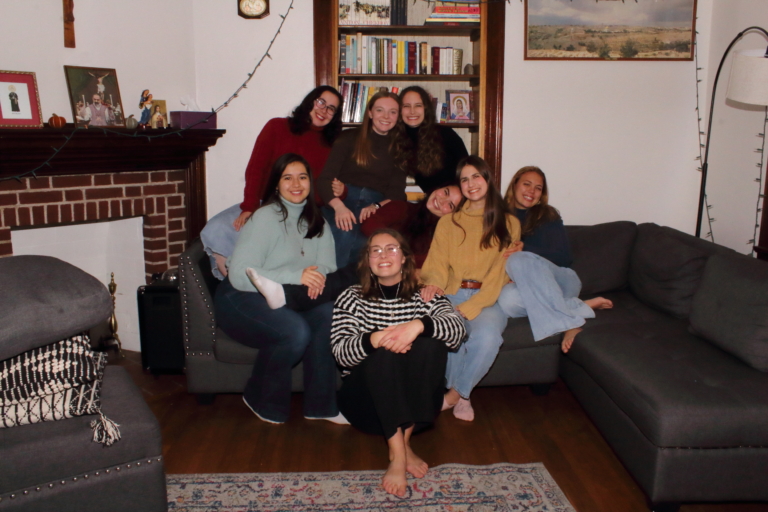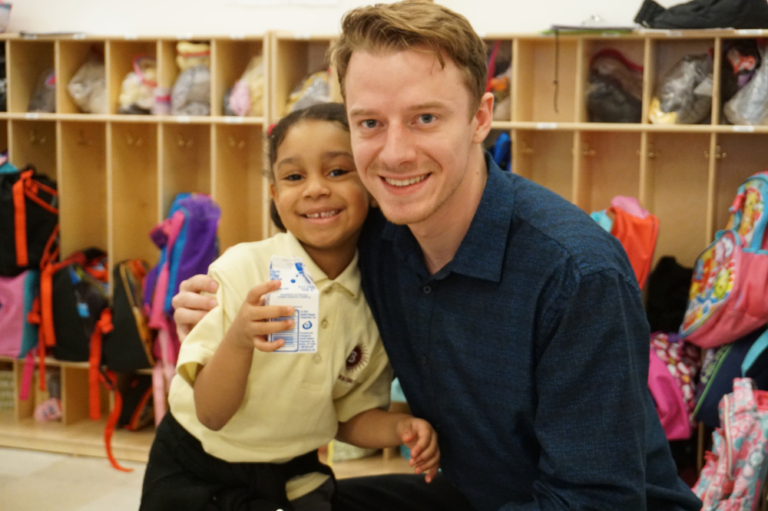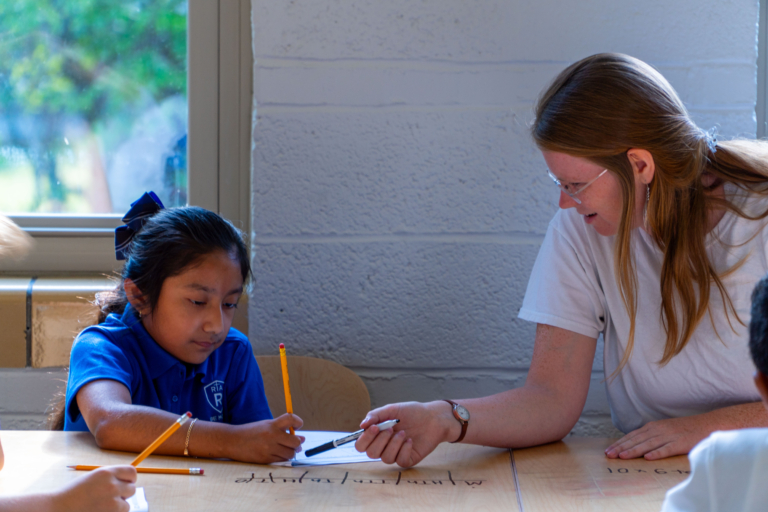By: Maria Longo, Seton Teaching Fellows Cohort 6
Maria graduated from the University of South Alabama and joined Seton Teaching Fellows after studying Psychology and Music in college. She currently works with first grade at Brilla College Prep Elementary School & teaches second grade Catechism at El Camino. She brings beauty to the lives of her students — and community members! — through her vast and creative love of art and story-telling, and her gentleness of spirit. Maria has been writing a short story during this time of quarantine and distance learning for our students, and kindly shared this excerpt with us. This story really stuck with us; it made us reflect on truth, beauty, and goodness (three things we strive to see in the life and work of a Seton Teaching Fellow) in a new way, and we are so happy to be able to share it with our readers.
The Grave
By Maria Longo
“Who is he?” the prince questioned.
“My father,” the little boy answered. He couldn’t have been more than six years of age.
The prince observed the scene, his eyes sad. “I see,” he said softly. He reached out to the old woman, asked for the shovel.
The woman bowed her head humbly. “Sir…”
“Please,” the prince pressed with a gentle smile. “Allow me to serve you in this way. I will see to it that a proper grave is dug.”
The old woman hesitated, clutching the shovel’s handle. “We cannot pay you.”
“There is no charge. Consider this a gift,” the prince assured her. “Please.”
The woman surrendered the shovel, and the prince helped her out of the hole.
“I can call for you when the grave is ready,” the prince said, allowing for her and the boy to take their leave. The old woman led her grandson by the hand back into their hovel. Then, the prince stepped down into the hole the two of them had started and set to digging.
Odelia watched him, aghast. “Sir!”
“Ah, my apologies,” the prince said, glancing up at her without stopping his work. “Would you like to help? They seem to only have one shovel, but perhaps we could make do.”
Odelia stared at him. “You can’t be serious.” She gave a short, disbelieving laugh.
The prince struck deep into the earth and tossed the dirt out onto the ever-growing pile. “Did I give you the impression that I was joking?” He speared the ground again.
Odelia let out another scoffing laugh. “A woman of my family and stature digging the grave of a common man? From a family of little consequence?”
“Little consequence?” the prince repeated, shaking his head. “Did you not see the way that woman and child were struggling? Did you not see their sadness? They are suffering from grief and loss!”
“I understand that it is an unfortunate situation. They seem to have lost their source of income, and I am sure they will be hard pressed to make ends meet.”
“Is that all you can think of?” the prince demanded, finally stopping to give her his full attention. “They loved him!”
“Well, certainly,” Odelia snapped in defense. “I did notice that, too!”
“Have you no compassion for them then?”
“Of course, I do!”
“But not enough to move you,” the prince said in exasperation and a hint of—what? Sadness? Pity?
“Move me?’ Odelia scoffed. “What on earth are you talking about?”
“You might have sympathy for them as you said,” the prince explained, “but not enough to draw you out of your own pride. That’s what’s truly unfortunate here.” He went back to shoveling.
Odelia opened her mouth like a fish, but she found, much to her dismay, that she had nothing else to say about it. She beat her fists against her sides and turned about as if searching their surroundings for a final word on the matter. She found none, so she circled back and glowered at the prince. “Well, what am I to do then?”
“That’s not my decision to make, is it?” the prince replied.
With a growl, Odelia stormed over to the fig tree and sat herself down on a sparse bit of grass. From the shade of the leaves, she glared at her companion, suddenly wishing she had never come in the first place. He had tricked her! He was a fool and had tricked her into following him into foolishness! Humiliation bit at her for, of course, she had agreed to coming with him, but she quickly excused herself on the grounds that she hadn’t known what she was getting herself into. This man clearly did not understand the way things should be done. He didn’t know who those commoners were or who she was. She simmered angrily while he labored.
As time passed, she shifted, quickly becoming uncomfortable on the ground. She straightened out her legs when they became sore, but after that, she couldn’t find a position that didn’t bother her in some way. She dug a pebble out from beneath her and tossed it away. “It’s boorish just sitting here watching you,” she called out.
“Well, you might help me,” the prince offered lightly.
Odelia narrowed her eyes. She had a feeling he was being cheeky with her. “And it’s uncomfortable on the ground! It’s not fair being stuck here!”
“My lady,” the prince said, lifting another shovel full of soil and sparing her a look. “You are in no way tied to me. You have the freedom to do as you wish.” He flung the dirt aside.
“What?” Odelia cried. “Are you saying I should leave? Me? A woman of the high court wandering about the city alone? Like some common maid? Is that what you think I should do?”
The prince closed his eyes and breathed deeply for a moment. “Lady, I gave you no inclination either way. I merely stated that you have leave to go or stay as you so desire. Now, if you please, I have work to do.”
Odelia puffed out her cheeks when she saw he wasn’t looking, entirely put out. She wrapped her arms around her knees and set to sulking again. Who did this man think he was to say such things? And to her even! Some “prince” he was! He had no proof of any title at all, only his word. And here she was waiting on him. She scrunched up her nose. What a sorry lot indeed!
She slid herself over until her back was against the trunk of the tree and the leaves fanned and draped down over her. She gazed up into the branches, catching a glimpse of sky here and there amidst the green. Figs always reminded her of her mother and of when the two of them would take long walks past the orchard and through the palace gardens. When the fruit was ripe, they would always pluck a few to share between them. And even if there was no fruit ready to pluck, her mother would always peek in on the buds.
“Odelia,” her mother would call her over. She would show Odelia the most promising of the harvest and quote to her old folk songs. “’Even if the fig tree fails and there be no fruit to harvest. Still, we shall love. Forever shall we love.’”
Odelia could smell the sweet juice and feel it rolling down her fingers as she peeled the skin back to taste its flesh. “Forever shall we love.”
Then, blinking wildly, Odelia was disoriented. The fig tree, the smell, the taste of summers passed remained, but her mother had vanished. Odelia found that she was tucked away beneath the tree rather than strolling past it, ghosting her fingers over its leaves.
“My apologies,” the prince said softly. “I had hoped I wouldn’t startle you.” He was crouching before her, holding aside the branches.
So it had been a dream then. Odelia quickly remembered herself and straightened her skirts, folding her hands in her lap. “Are you finished?”
“I am,” the prince replied. “We are about to bury him now. Would you like to stand with us?” He held out a hand to her.
Odelia felt she should say no to save face, but then she realized that she didn’t want to be left alone. She took the proffered hand and allowed the prince to help her out from beneath the foliage. The old woman and the little boy were already standing beside the pit, their heads bent. In silence, Odelia followed the prince over to them, and they all gazed into the grave together. Odelia noted that the prince must have carried over the body and neatly arranged it himself. The corpse’s face was grim and grey, but he did not appear haggard. His hair was well kept and his clothes, though worn, were put together well. This clearly was a man of responsibility and principle despite his low station. The old woman wept quietly, and the boy clung to her, half hiding his face in her side. The prince stood solemn and still as if regarding an admirable companion. Bidding farewell at the end of a long journey. Odelia looked back into the grave again, feeling uneasy and somehow embarrassed. It appeared she was the only one with nothing to offer this poor man at his very end. But there was, she thought then. It was ridiculous. Perhaps, even presumptuous. No doubt they would scorn her for it, and she would further embarrass herself. But then Odelia thought back to her mother again, and her mind was made. She swallowed thickly and with a shaky breath, let her voice waver out:
Even if the fig tree fails
And there be no fruit to harvest
Even still we shall love
Forever shall we love
If the herd and flock be lost
And the wells run deep and dry
Even still we shall love
Forever shall we love
For even if our labors fail
And we lose all we can give
Even still we shall love
Forever shall we love
As she sang, her voice grew steady and her breath easy. She felt the prince watching her, and when she finished, she looked back. The smile on his lips was small, but his eyes were beaming, sharp and thoroughly pleased. Odelia quickly turned away and lowered her gaze. She was becoming uncomfortable again.
“Nina,” the prince spoke, placing a hand on the old woman’s shoulder. “I will bury him now.”
The woman managed to wrinkle her face into a watery smile. “Bless you, child. May the Spirit bless you.”
The prince picked up the shovel, which had been set aside. Odelia stood there with the grieving family while the prince worked. They watched the dead man disappear bit by bit beneath the rolling pieces of earth. Odelia found that her mind slipped into an easy blank. She no longer lacked for patience and comfort. Those things were beyond her now, as was her desire for them. She had not seen a corpse nor heard that song since the death of her mother. She felt nothing. She knew nothing but the hollowness inside her. She was a freshly glazed pot, she realized—smooth, glossy, beautiful, but entirely empty. She didn’t know how long it took before the prince poured the last of the earth onto the grave, and she only emerged from her stupor when she noticed he had stopped moving.
“Nina, I am gravely sorry for your loss,” he addressed the old woman again. “May the Spirit be always with you.” He bowed his head to the boy. “And with your son.”
The woman took his hand in her misshapen fingers. “Bless you, my child. May the Spirit ever bless you.” She gave Odelia a look of gratitude, the depth of which Odelia knew she did not deserve. “May the Spirit bless you both.”
The little boy fled from his grandmother’s side and into the hovel, leaving them at a loss.
“Please…please forgive my child,” the woman begged. “He is young and does not understand himself.”
But then the boy returned, carrying something in hand. He took Odelia’s hand and pushed it into her palm. It was a smooth, white stone, perfectly round and secured to a leather cord, a necklace.
The old woman appraised the boy. “Abba made that for your mother,” she said curiously.
“She has no use for it, she hasn’t for years,” the boy said. “Abba can’t use it now, and neither can we.” He looked resolutely into Odelia’s eyes with a promise. “I will love forever.”
Odelia was afraid she would start shaking. She thought that she might cry.
Thankfully, the prince saved her the embarrassment. “We should be on our way,” he explained, handing the shovel back over to the woman.
The woman bowed. “I thank you and wish for your greatness. You have paid us a kindness we can never return in full.”
“’May you find peace until the end of time,’” the prince quoted the traditional farewell with a smile. He began walking, Odelia joined him. He guided her as if with an invisible hand, and she remained at his side. She held the necklace tight to her breast, following without really seeing anything of their direction or path.
When they had gone some distance, she broke from her trance. She unclasped her hands and held out the little treasure to the prince. “You deserve this gift more than I do.”
The prince glanced at her and chuckled. “Really? And what would I do with it? It’s not exactly a thing a man would wear.”
Odelia frowned. “You might give it to someone.” The necklace was a plain and simple thing, but to her, who knew its story, its maker, and its givers, it was more precious than any cut gem.
The prince caught her eye and gave her a meaningful look. “It was given to you. A part of loving others is knowing how to accept the love of others.”
Odelia contemplated this and slowed to a halt. The prince stopped and waited. “Will you help me with it?” she asked, taking to two ends of the cord and handing them to him.
“It would be an honor, my Lady,” the prince grinned. He stepped behind her and tied the treasure loosely around her neck. The stone fell just over Odelia’s collarbone, warm from when her hands had held it tight. She touched it gently and thanked the prince.
“Of course, Lady,” he replied briskly. “Would that I may serve you again.”
The pair continued away from the city walls and quietly headed for the hill country.
From the Author:
The passage entitled “The Grave” is a piece of a wider story that follows the transformation of a soul (Odelia) as she better knows her savior (the prince), which in turn leads her to a deeper knowledge and understanding of herself. Similar to the different dimensions of [the biblical book] Song of Songs, this text may be read for what it is, a simple love story, or in parallel to other things (the relationship of the individual soul with the Lord, the relationship of the Israelites to Yahweh, the relationship of the Church and God). In this particular portion of the story, Odelia has accompanied the prince alone into the outskirts of the city (something akin to Jerusalem during the life of Christ), where they encounter an old woman and her grandson attempting to bury her son (the boy’s father). Moved with pity for them, the prince stops to bury the dead man for them since they do not have the physical strength to do so themselves. Despite her initial feelings, Odelia comes to recognize their dignity as well as the goodness, truth, and beauty of the charity the prince shows them.



